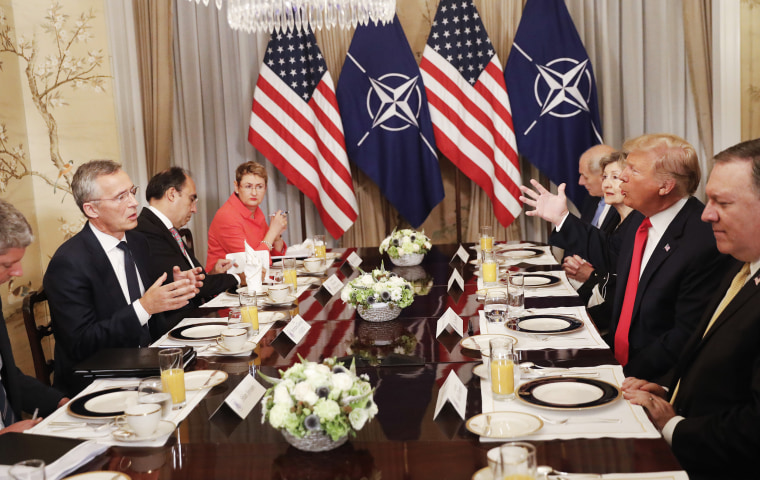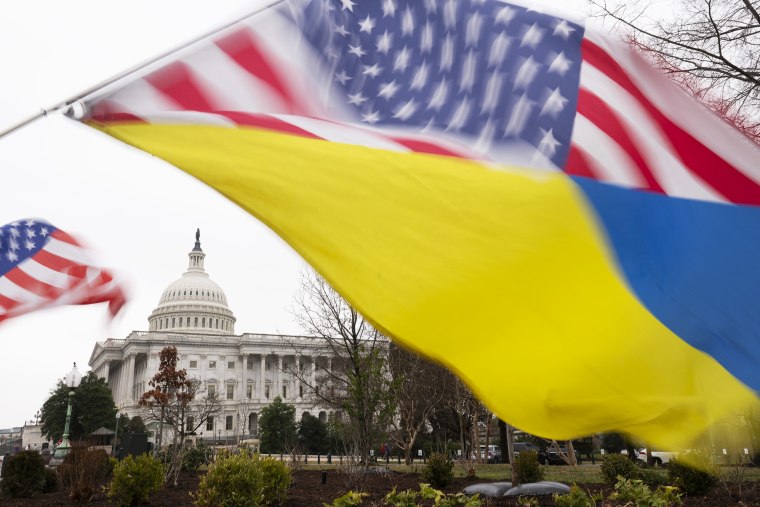Trump’s NATO comments prompt Europe to reexamine Russia threat
LONDON — Top European officials say they are alarmed at Donald Trump saying he would not necessarily protect NATO allies — but the former president’s words will not have come as a surprise.
In fact, many staunch Trump critics agree with his central point, that members of the military alliance set up in the wake of World War II to defend against the then-Soviet Union need to up their defense spending.
Now, Europe must make a decision, according to some experts: Hope American protection endures, or bolster its own withered military forces that on their own would likely be ill equipped to repel a Russian attack.
“The Europeans have to keep on waking up to the strategic reality that Europe might have to defend itself without its primary guarantor, which is the United States,” said Fabrice Pothier, former head of policy planning for two NATO secretaries general, including incumbent Jens Stoltenberg.
Europe “cannot completely replace the U.S. deterrent, because this is the No. 1 global military power,” said Pothier, now CEO of Rasmussen Global, a European political consultancy. But “we have to have enough deterrence of our own so we’re not caught with our trousers down.”

The renewed concern comes after Trump told a South Carolina rally Saturday that he would encourage Russia to “do whatever the hell they want” to any NATO country that didn’t pay enough for defense.
The European rebuke to Trump’s latest remarks has been swift.
Stoltenberg said it “undermines all of our security” and “puts American and European soldiers at increased risk.”
The “reckless” statement would “serve only Putin’s interest,” Charles Michel, president of the European Council, said, referring to Russian President Vladimir Putin.
While the European Union’s top foreign policy official, Josep Borrell, said that “NATO cannot be an ‘a la carte’ military alliance” that “depended on the humor of the president of the U.S.”
Ben Hodges, former commander of the U.S. Army in Europe, told NBC News that it was “disgusting and despicable that a former American president, and now a presidential candidate, would say something that is so dangerous for American security, as well as the security of our allies.”
This is not new territory for Trump, who repeatedly criticized the postwar military alliance during his first term. But it’s nonetheless an ultimatum that threatens to upend the entire postwar security arrangement between the U.S. and Europe.
Article 5 of NATO’s founding treaty has always been taken to mean that if a smaller European nation was attacked by Russia, then the U.S. and all the other allies would come to that country’s defense. It’s an all-for-one-and-one-for-all pact that supporters say has a track record of deterring a world war with the former Soviet Union and more recently Putin.
Trump’s central critique is that some NATO countries — including economic big hitters such as Germany — do not pay the agreed 2% of their gross domestic product toward defense.
Trump took credit for a rise in this spending during his first term, although in reality the increase began in 2014 after Russia invaded Ukraine’s Crimean Peninsula. He has often mischaracterized this spending arrangement, implying that these countries “owe” the U.S., when in fact NATO’s 2% agreement is only about each country’s domestic defense spending.

Many presidents, from Harry Truman to Barack Obama, have also urged the European nations to up their defense budgets. But most have done so in private, and none have come close to Trump’s blunt quid pro quo.
Trump’s outraged critics say that even the threat of reneging on NATO’s central promise could see Putin attack a smaller Eastern European country, if the Russian president thought there was a good chance Washington might not send the cavalry.
“Article 5 is a poker game: It’s about making the other player, Russia, believe that you have a stronger hand than them, and that you will respond,” Pothier said. “What Trump is doing is creating some ambiguity and doubt” about the strength of the Europeans’ hand, he added.
But as horrified as most mainstream voices are, there are also plenty of supporters who concede that part of Trump’s argument is correct: European nations have for too long been overly reliant on American protection — and it’s time they stood up for themselves by spending more on defense.
The front-runner for NATO’s top job, Dutch Prime Minister…
Read More: Trump’s NATO comments prompt Europe to reexamine Russia threat

